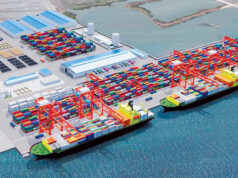From being once called the ‘sick man’ of Asia to adopting its new title of ‘rising tiger’, the Philippines has accomplished a lot in the span of half a century, economy-wise to say the least. Successfully achieving economic growth that rivals that of China, the country now faces some new problems. How do you sustain such a powerful momentum? Or more importantly, how do you distribute this newfound wealth equitably throughout the country’s many regions?
One solution put forth by experts and politicians is the decentralization of economic activity. Currently, the National Capital Region, and to some extent Region IV-A, continue to account for a majority of the Philippines’ gross domestic product (GDP). The other 15 regions combined accounted for less than half or 46.5% of the country’s GDP in 2016 according to the Philippine Statistics Authority. Clearly, there is a wealth of untapped potential in establishing new centers of growth elsewhere.
The province of Iloilo in Western Visayas stands ready to face the challenge. As one of the most accessible provinces in the Philippines, Iloilo can serve as a gateway to Visayas through its sea and air ports.
The Iloilo International Airport, the primary gateway to Iloilo, is the hub of regularly scheduled direct domestic flights to and from Manila, Cebu, Davao, General Santos, Puerto Princesa, and Cagayan de Oro. The airport also serves international flights from Iloilo to Hong Kong and Singapore. As the fourth busiest airport in the Philippines and the first airport in both Western Visayas and Panay island to be built to international standards, the Iloilo International Airport plays a huge role in the economic viability of the region, allowing Iloilo to become the trade and commerce hub of the Western Visayas region. Further development could see it become an international gateway to the country.
Meanwhile, the Iloilo seaports include ferry terminals along the Iloilo River in Lapuz district, fastcraft ferries from Bacolod, RORO ferries from Guimaras, and ferries from Palawan. The Iloilo Domestic Port in Fort San Pedro, Iloilo City Proper also serves shipping companies with routes from Manila, Cebu, Cagayan de Oro, and Zamboanga. The Port of Iloilo is even considered the leader of trade and a commercial hub for Western Visayas as it is one of the safest natural seaports in the Philippines.
Due to its strategic location, easy access, and developments in infrastructure, Iloilo’s economy is one of the most competitive in the country. For most of Western Visayas, Iloilo City stands as the center trade, commerce, finance, technology, medical tourism, hospitality, real estate, tourism, education, and industry. The politically independent highly urbanized city is home to various booming industries, such as the business process outsourcing (BPO), banking and finance, and retail industries. Notably, the popular food chain Mang Inasal is headquartered here.
Towards Iloilo’s northern parts, a strong fishing industry flourishes, owing to the bountiful fisheries of the Visayan Sea. Additionally, Iloilo’s agri-industrial central regions produce a wide array of agricultural products such as corn, rice, bananas, sugar, and pineapples among others as well as high-end crops.
Working the region’s many thriving industries are the vibrant and well-educated Ilonggos. In support of the province’s future growth, Iloilo is home to numerous schools and colleges, as well as ten major universities, eight of which are based in Iloilo City. These include the Central Philippine University, University of San Agustin, University of the Philippines Visayas, West Visayas State University, and the Iloilo Science and Technology University.
The abundance of skilled and literate workers have contributed to the rise of Iloilo’s BPO industry, and has spurred the employment rate and economic growth of the region. The rapid development of the industry in Iloilo City prompted the Department of Science and Technology-Information and Communications Technology Office and the Business Processing Association of the Philippines (BPAP) to name it as one of the Philippines’ next wave cities, recognizing its capacity to host information technology-business process outsourcing companies due to the availability of talent and relevant infrastructure.
This is proof of the province’s potential to become a beacon of economic growth. With a little more encouragement, Iloilo can give a lot more. — Bjorn Biel M. Beltran



